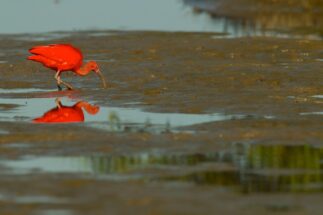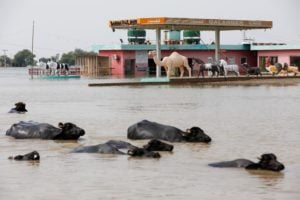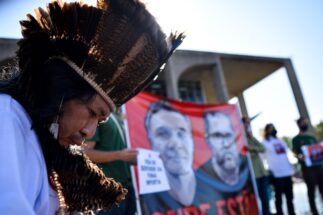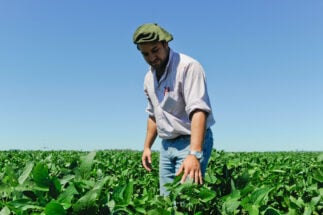Far away from the complexity of its conflicts and the daily life of its inhabitants, the fate of the Brazilian Amazon is being decided in meetings, commissions and courts. The capital city, Brasília, is the political stage where battles for the future of the forest are fought, and where a model of occupation and exploitation has been upheld, no matter which government is in charge.
Listen now
This article is a summary of the fifth episode of Amazônia Ocupada, a new podcast series from Diálogo Chino, available in Portuguese only. Listen here.
But it’s also here in Brasília that resistance is happening, inside and outside parliament, and new projects for the future of the biome are being discussed.
The national capital is the last stop in Diálogo Chino’s new podcast series, Amazônia Ocupada, produced in association with Trovão Mídia. Across five episodes, we have travelled along the BR-163 highway, a route that illustrates how soybean agriculture, cattle farming, logging and mining have expanded throughout the Amazon over the last five decades.
The colonisation and economic exploitation of the forest did not occur naturally or spontaneously: they were only possible because this model is perpetuated in the halls of power in the Brazilian capital.
Among the main issues currently being discussed in Brasília is the marco temporal – the “temporal milestone” that sets a historical cut-off date for the demarcation of indigenous territories, and which has spurred heated debate among environmental activists and pro-agriculture ruralists. This lawsuit in the Federal Supreme Court argues that indigenous peoples can only claim lands where they were on before 5 October 1988, when the country’s constitution was ratified.
The action arose from a land dispute of the Xokleng ethnic group, in the state of Santa Catarina, but the decision will serve as a reference for all demarcations of indigenous lands in the country. The debate has exposed how the ruralist bench of the national congress and institutions linked to agriculture and cattle ranching seek to expand the sector across Brazilian lands, not only in the Amazon.

Many indigenous leaders have spoken out over the marco temporal case. The proposal, these groups say, disregards the expulsions, forced removals and all the violence suffered before the entry of the constitution. They fear that the right to territories, taken back after decades of struggles, will be lost, as well as to those that are still in the process of demarcation.
“We are here to claim all these rights in the face of setbacks and this government’s genocidal attack on all indigenous peoples in regions all over Brazil,” said Laura Parintintin, an indigenous leader and student, at a protest in Brasília in June.

But this dispute is not recent. The discussion around the marco temporal in the supreme court illustrates a battle for land that has permeated the country’s entire history. “The formation of the Brazilian state is based not only on concepts, but also on alliances with ruralists [that have existed] since Brazil has been Brazil,” explains Mayrá Lima, a political scientist at the University of Brasília, who researches the ruralist benches in Congress.
Today, the Parliamentary Agricultural Front has 280 members and meets on agribusiness-related issues. Beyond the discussion of the marco temporal in the supreme court, the caucus has supported the approval of bills such as the regularisation of mining in indigenous territories, changes in environmental licensing (which Geller led), more flexible approval of pesticides and the granting of amnesty for illegal occupation of public lands. These projects have been dubbed by environmentalists as the “destruction package”.
It is logical that the Amazon needs infrastructure and public services, but in the right way
“We need to move forward in these bottlenecks that we defend here in congress,” said Geller. “You have to preserve, but what about the people who need to eat?”
Ruralists in Congress have gained greater political backing during the Bolsonaro government. “I want to say that this government here is yours,” the president told deputies from the ruralist caucus in 2019.
This backing explains the support that sectors linked to agribusiness have given to Bolsonaro, as previous episodes of Amazônia Ocupada have discussed. This alliance resulted in policies of zero demarcations of indigenous territories by the current government, the dismantling of environmental inspection agencies, and upheaval at the ministry of environment itself.

The administration began to move to “overthrow environmental legislation”, according to Suely Araújo, former president of environmental protection agency IBAMA and a legislative advisor for nearly 30 years. “The parliamentarians who act on behalf of the environment have always been few. But the civil society organisations had important support in the Ministry of the Environment, regardless of the president. In the Bolsonaro government this has been reversed,” she explains.
Araújo says that her fight over the past four years in Brasília “has been to prevent, all the time, every day, the retrogression of environmental legislation”. She says the pitching of environmental preservation against economic development, as suggested by Geller, is outdated.
“It is logical that the Amazon needs infrastructure and public services, but in the right way. Models that are not designed for the Amazon, and of environmental degradation, are not the future,” she says. “What the Amazon needs is a standing forest, investment in science, technology and respect and appreciation of traditional knowledge.”
We have non-indigenous supporters, but it’s different when an indigenous relative is there
Polls have so far suggested that the looming presidential elections will bring a change of government and, according to specialists like Araújo and Lima, a realignment of Brasília’s priorities on indigenous and environmental issues.
At protests in the capital, young leaders told us that the last years of the current government were important in bringing indigenous groups together, to organise themselves and dispute spaces of power, for example in indigenous peoples standing as candidates in national and regional elections.
“It is through these spaces that we will be able to change something in the indigenous issue,” said Thaira Pripra, a student who came to protest against the marco temporal. “We have non-indigenous supporters, but it’s different when an indigenous relative is there.”
According to her, hope lies in people like Joênia Wapixana, the only indigenous representative in congress, as well as in the possibility of electing a bancada do cocar – a “bench of the headdress” made up of indigenous and pro-indigenous voices.
The fifth and final episode of Amazônia Ocupada is now available, in Portuguese only, on Spotify, Apple, Amazon and Deezer.









